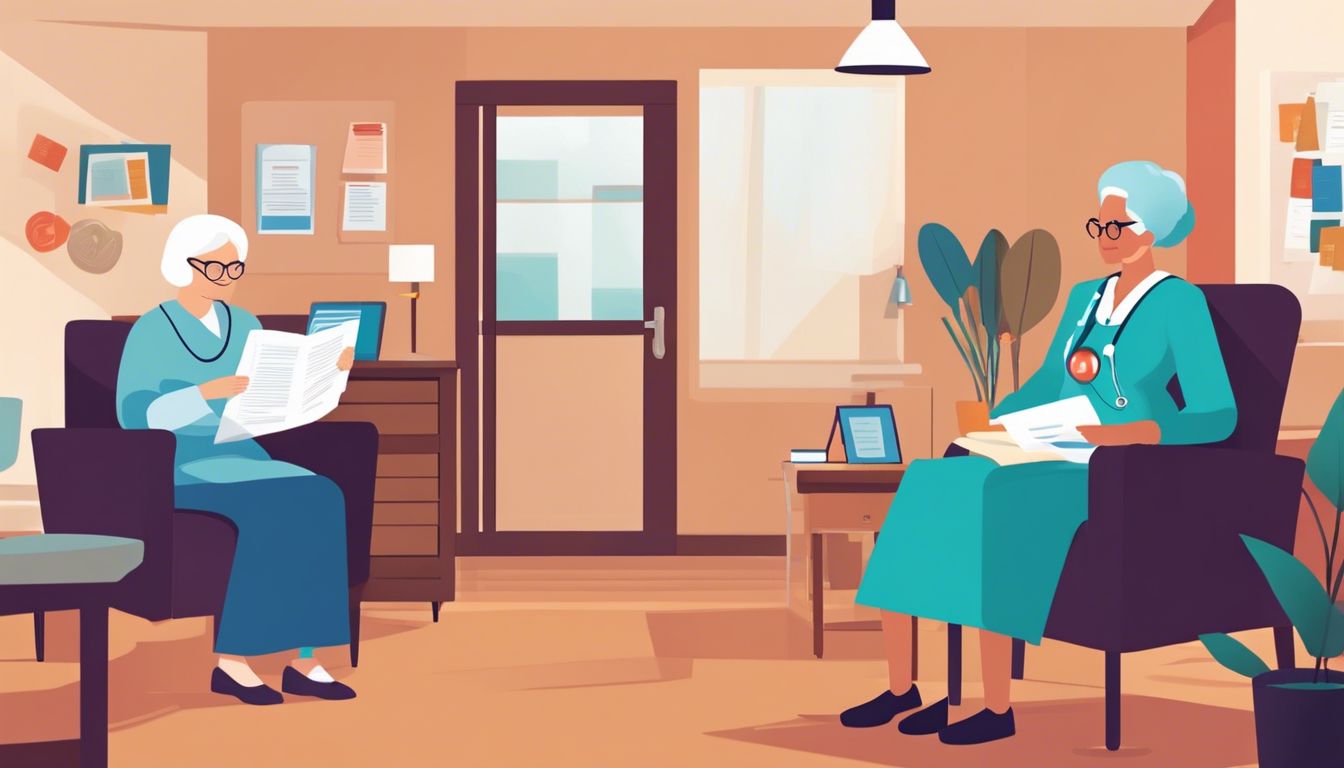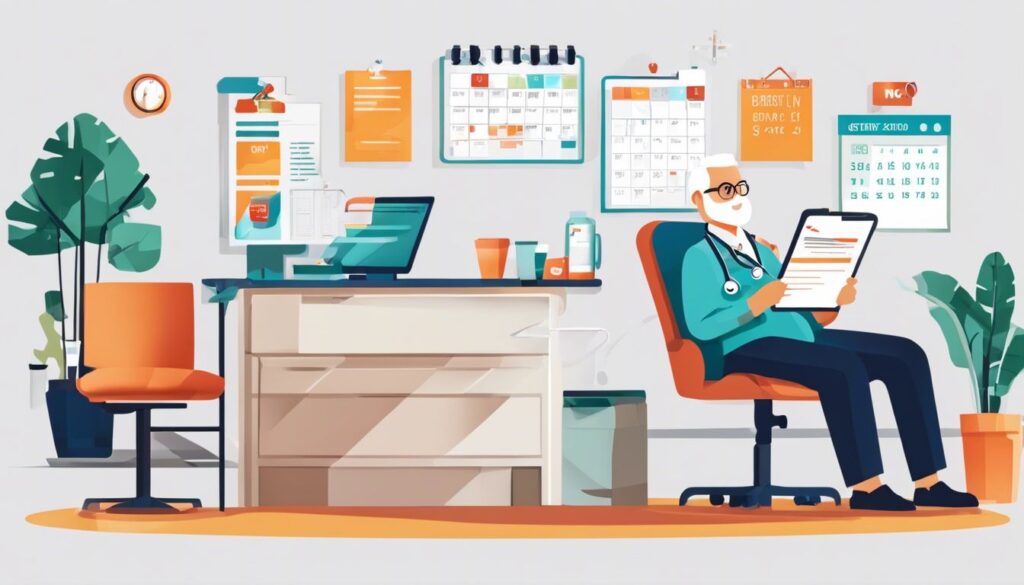Many seniors worry about their health as they age. More than half of adults 65 and older skip recommended preventive screenings. Regular check-ups can detect health issues early, improving treatment outcomes.
This guide explores the pros and cons of common screenings for older adults.
📋✅
- Preventive screenings help detect diseases early in seniors, leading to less invasive treatments and better health outcomes.
- Regular screenings improve management of chronic conditions like diabetes and hypertension in older adults.
- False positives from screenings can cause unnecessary stress and further medical procedures for seniors.
- Physical discomfort and anxiety are potential risks of some invasive screening procedures like colonoscopies.
- Seniors should discuss the pros and cons of specific screenings with their doctors to make informed decisions about preventive care.
Key Benefits of Preventive Screenings

Preventive screenings catch health issues early. They help seniors manage existing conditions better.
Early detection of diseases
Early detection through preventive screenings identifies risk factors for heart disease, diabetes, cancer, and osteoporosis. These screenings lead to less invasive treatments and more effective management of health conditions.
For seniors, annual lung cancer screening using low-dose computed tomography is recommended for those aged 50 to 80 with a 20 pack-year smoking history. Women aged 65 or older benefit from osteoporosis screening via bone density tests.
Early intervention reduces complications and improves overall health outcomes for seniors. The next section explores how preventive screenings help manage chronic conditions.
Improved management of chronic conditions
Regular preventive screenings enable better management of chronic conditions in seniors. These screenings help detect health issues early, allowing for timely interventions and adjustments to treatment plans.
For instance, diabetes screenings every 3 years for overweight individuals up to age 70 can lead to earlier diagnosis and more effective control of blood sugar levels. Routine blood pressure checks during physical exams help monitor hypertension, a common chronic condition among older adults.
Prevention is better than cure.
Proper management of chronic illnesses through screenings can significantly improve quality of life for seniors. Physical exams that include assessments of depression, anxiety, and lifestyle factors contribute to comprehensive care.
These evaluations allow healthcare providers to address potential mental health issues and recommend lifestyle modifications. By catching problems early and adjusting treatments as needed, seniors can experience fewer complications and better overall health outcomes.
How Seniors Can Maintain Cognitive Health to Reduce the Risk of Dementia
Seniors can maintain cognitive health through regular mental exercises and social engagement. Brain-stimulating activities like puzzles, reading, and learning new skills help keep neural connections active.
Physical exercise, particularly aerobic activities, boosts blood flow to the brain and promotes neuroplasticity. A healthy diet rich in omega-3 fatty acids, antioxidants, and vitamins supports brain function.
Adequate sleep, typically 7-9 hours nightly, allows the brain to consolidate memories and clear toxins.
Managing cardiovascular risk factors is crucial for cognitive health. Controlling high blood pressure, diabetes, and high cholesterol reduces the risk of vascular dementia. Regular health screenings, including vision and hearing tests, help detect and address issues that could impact cognitive function.
Seniors should limit alcohol consumption and avoid smoking to protect brain health. Engaging in meaningful social activities and maintaining strong relationships provides mental stimulation and emotional support, contributing to overall cognitive well-being.
Potential Risks of Preventive Screenings
Preventive screenings can lead to false positives, causing unnecessary stress and further medical procedures. They may also expose patients to radiation or other risks associated with certain tests.
Possible false positives/negatives
False positives in preventive screenings can lead to unnecessary stress and invasive follow-up procedures. These errors occur when a test incorrectly indicates a health issue that doesn’t exist.
Conversely, false negatives fail to detect actual problems, potentially delaying crucial treatment. Seniors face heightened risks from both scenarios due to age-related health vulnerabilities.
Accurate interpretation of screening results requires careful consideration of individual health factors and medical history.
Mammograms and prostate-specific antigen tests are examples of screenings prone to false results. The U.S. Preventive Services Task Force recommends shared decision-making between seniors and healthcare providers to weigh the benefits and risks of specific screenings.
This approach ensures personalized care that considers the potential consequences of inaccurate results on a senior’s physical and emotional well-being.
Physical and psychological stress
Preventive screenings can cause physical discomfort and anxiety for seniors. Invasive procedures like colonoscopies may lead to pain or complications. False-positive results often trigger unnecessary stress and follow-up tests.
The psychological impact of waiting for results or facing a potential diagnosis can be significant. Seniors may experience fear, worry, and sleepless nights. Healthcare providers must consider these stressors when recommending screenings.
Balancing the benefits of early detection with the risks of patient distress is crucial. The next section examines how seniors and doctors can make informed decisions about preventive care.
Conclusion
Preventive screenings offer seniors vital health benefits. Early detection can save lives. Regular check-ups manage chronic conditions effectively. Risks include false results and unnecessary stress.
Seniors should discuss screening options with their doctors. Informed decisions lead to better health outcomes.
FAQs
1. What are key preventive screenings for seniors?
Essential screenings include colorectal cancer tests, breast and cervical cancer screenings, blood pressure checks, and cholesterol tests. These help detect health issues early.
2. How often should seniors get flu shots?
Seniors should get flu shots annually. High-dose options like Fluzone or Fluad offer stronger protection for older adults against seasonal influenza.
3. Are there risks to cancer screenings?
Yes. Overscreening can lead to false positives, unnecessary procedures, and anxiety. Discuss individual risk factors with your doctor to determine appropriate screening frequency.
4. What vaccinations do seniors need?
Important vaccinations include PPSV23 (Pneumovax) or PCV15 for pneumonia, and Shingrix for shingles. Some may need boosters for optimal protection.
5. How does colon cancer screening benefit seniors?
Colon cancer screening can detect precancerous polyps or early-stage cancer. Options include colonoscopy, fecal occult blood tests, and CT colonography.
6. Are there screenings for sexually transmitted infections in seniors?
Yes. The U.S. Preventive Services Task Force recommends screenings for HIV, syphilis, and hepatitis C in at-risk seniors, including men who have sex with men.









